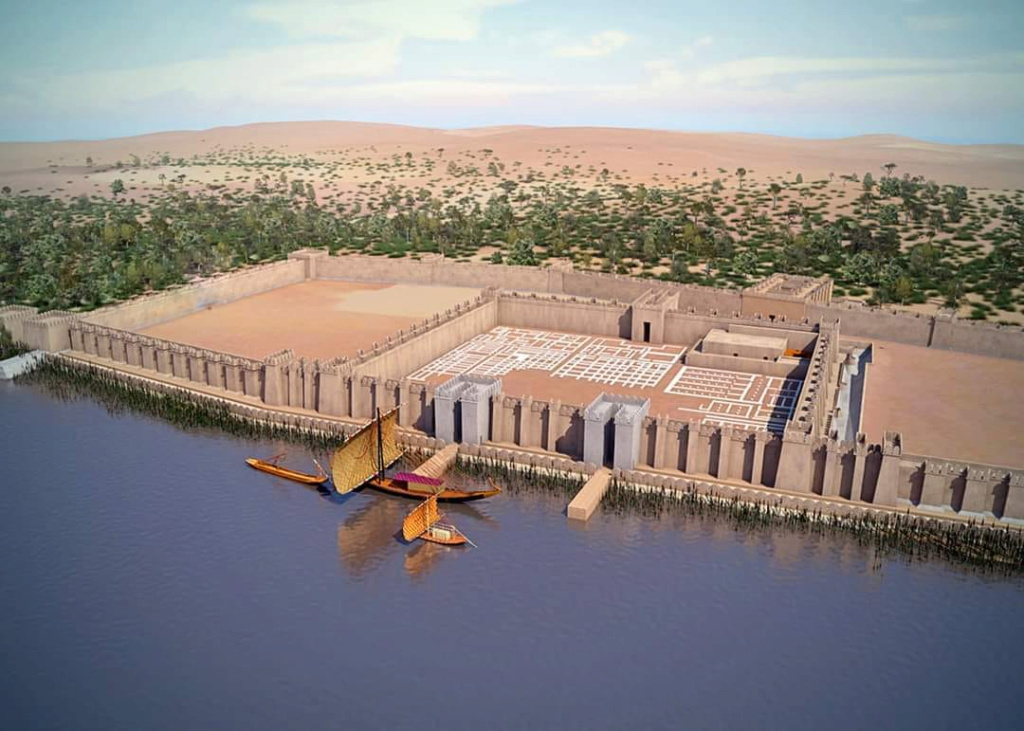The sanctity of the Euphrates River

In ancient Iraq - it was dug by the gods and it is the river of sacred temples and the creator of everything - it has a special prayer - the Euphrates River was sacred to the Sumerians, Akkadians and Babylonians who lived on its banks and built their ancient civilizations on its banks, as this river was the source of their lives and their wealth - the Sumerian, Akkadian and Babylonian cities were They are all built on the banks of the Euphrates River or on its branches - the book of the Old Testament - the Torah - which described Paradise in which the following was stated - the Euphrates River, after watering Paradise, branches into four branches: - Pishon - Gihon - Hadakil - Euphrates - the first includes the depressions of Habbaniyah and Abi Debs - the second refers to The current Al-Hindiya River - the city of Tuwayraj - the third is the Saqlawiyah River near the city of Fallujah - the fourth is the course of the ancient Euphrates River known as the Kuthi River - in the city of Al-Musayyab - The Nile River also had sanctity for the ancient Egyptians
Every year, the Egyptians would offer a sacrifice to their river, one of the beautiful virgins, by throwing her into the angry river current in the middle of a major religious party. Likewise, the Sumerians, Akkadians, and Babylonians believed that the flood came from the wrath of the gods due to human corruption and human sins and sins, and they must be appeased by presenting offerings to them, as the Euphrates was the land of Sumer. Akkad and Babylon - the source of the Nile to Egypt - was the great river Euphrates for the Sumerians, Akkadians and Babylonians, the source of prosperity and life, the creator of everything, and it is the river of sacred temples. The gods dug it so that the country could enjoy the blessing of its waters, and it is necessary to please them and avoid their anger. To this day, there are still traditions among the ancient Iraqis that involve the sanctification of water, connected to the ancient belief that he is the follower of water. People here today, especially women, offer the Nadhrali - Khidr Elias - who is believed to be the Sultan of Water, and he was alive entrusted with the rivers, so they offer candles to him by placing them on a small plank of wood. And throwing it into the river. The procedure followed for that is to light candles on Friday night, which is the best night, and someone wades into the river water and throws it into the middle of the stream - and in a prayer directed to the Euphrates River, which was sacred to the Sumerians, Akkadians, and Babylonians alike, an inscription on a Babylonian clay tablet inscribed on it said - O river. The Creator of all things, when the great gods dug you up, they established good things on your shores and in the folds of your deep. God - Eya - the King of the Deep built his place and blessed it with an unparalleled abundance of water. - O great river, O glorious river, O river of holy temples - Your waters release the clouds and turn me over with compassion, and take what is in my body and throw it on your shores and drown it on your banks and cover it in your depths - This is another Babylonian text in a prayer directed to the Euphrates River - and the great river flowed like the sea in its breadth - When Eridu was established and the pools were built - these are the pools standing in the middle of the deep, fresh water - and where the great and glorified god resides - Marduk - the greatest of the Babylonian gods - planted reeds to block the face of the water - and he built the earthen banks and supported them with reeds - to prepare for the gods a dwelling place in the place that our hearts long for - and he came. The wording of the Euphrates River in the book of the Torah - Genesis is as follows - and a river came out of Eden and watered Paradise - and then it bifurcated and became four heads, including the Euphrates - as the word Euphrates came in the book - the Qur’an -- And He is the One who parted the two seas: this is fresh and bitter, and this is salt and brackish, and He has placed between them an isthmus and a blocked stone - Surat Al-Furqan - Verse 52 - And the two seas are not equal: this is sweet and bitter, sweet to drink, and this is salt and brackish, and from all of them you eat fresh meat and extract ornaments to wear, and you see the ark in which there are places for you to seek of His bounty, and perhaps you will Thank you - Surat Fatir - Verse 11------
Sources
Book on the history of Mesopotamia civilization - in light of irrigation and agricultural projects, archaeological discoveries and historical sources - Part 1 - pp. 441 - 443 - 444 - 445 - Dr. Ahmed Sousse

